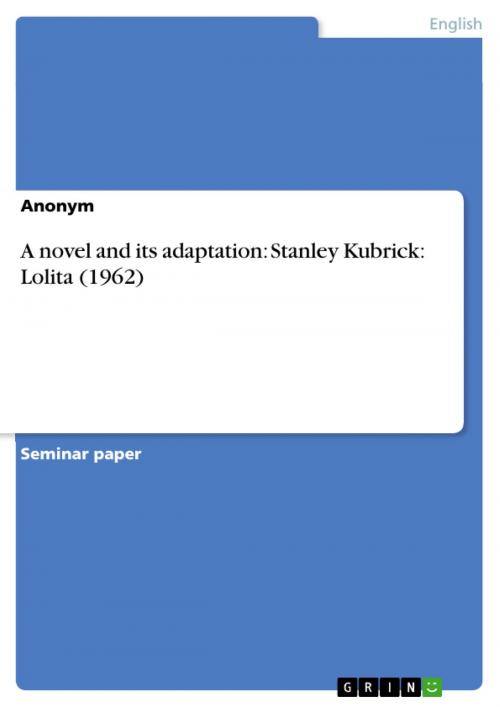A novel and its adaptation: Stanley Kubrick: Lolita (1962)
Fiction & Literature, Literary Theory & Criticism, British| Author: | Kerstin Schulze | ISBN: | 9783640911820 |
| Publisher: | GRIN Publishing | Publication: | May 10, 2011 |
| Imprint: | GRIN Publishing | Language: | English |
| Author: | Kerstin Schulze |
| ISBN: | 9783640911820 |
| Publisher: | GRIN Publishing |
| Publication: | May 10, 2011 |
| Imprint: | GRIN Publishing |
| Language: | English |
Seminar paper from the year 2009 in the subject English Language and Literature Studies - Literature, grade: 1,7, , language: English, abstract: If one looks at recent cinema charts, the literary eye will notice that film adaptations of literary products are quite common there. Novels, especially if they were successful on the market, seem to be an ideal source for film-makers. Vladimir Nabokov's successful novel Lolita is no exception. Though this novel for various reasons almost seems like it is not screenable, in 1962 Stanley Kubrick directed an adaptation. Of course he faced the usual critique: the adaptation cheapen the original artworks reputation, it abuse the author's thoughts and the artwork, content and use of language were only insufficiently borne in mind. This paper tries to examine whether or not this critique, on adaptation in general and on Kubrick's work in detail, is justified or not.
Seminar paper from the year 2009 in the subject English Language and Literature Studies - Literature, grade: 1,7, , language: English, abstract: If one looks at recent cinema charts, the literary eye will notice that film adaptations of literary products are quite common there. Novels, especially if they were successful on the market, seem to be an ideal source for film-makers. Vladimir Nabokov's successful novel Lolita is no exception. Though this novel for various reasons almost seems like it is not screenable, in 1962 Stanley Kubrick directed an adaptation. Of course he faced the usual critique: the adaptation cheapen the original artworks reputation, it abuse the author's thoughts and the artwork, content and use of language were only insufficiently borne in mind. This paper tries to examine whether or not this critique, on adaptation in general and on Kubrick's work in detail, is justified or not.















